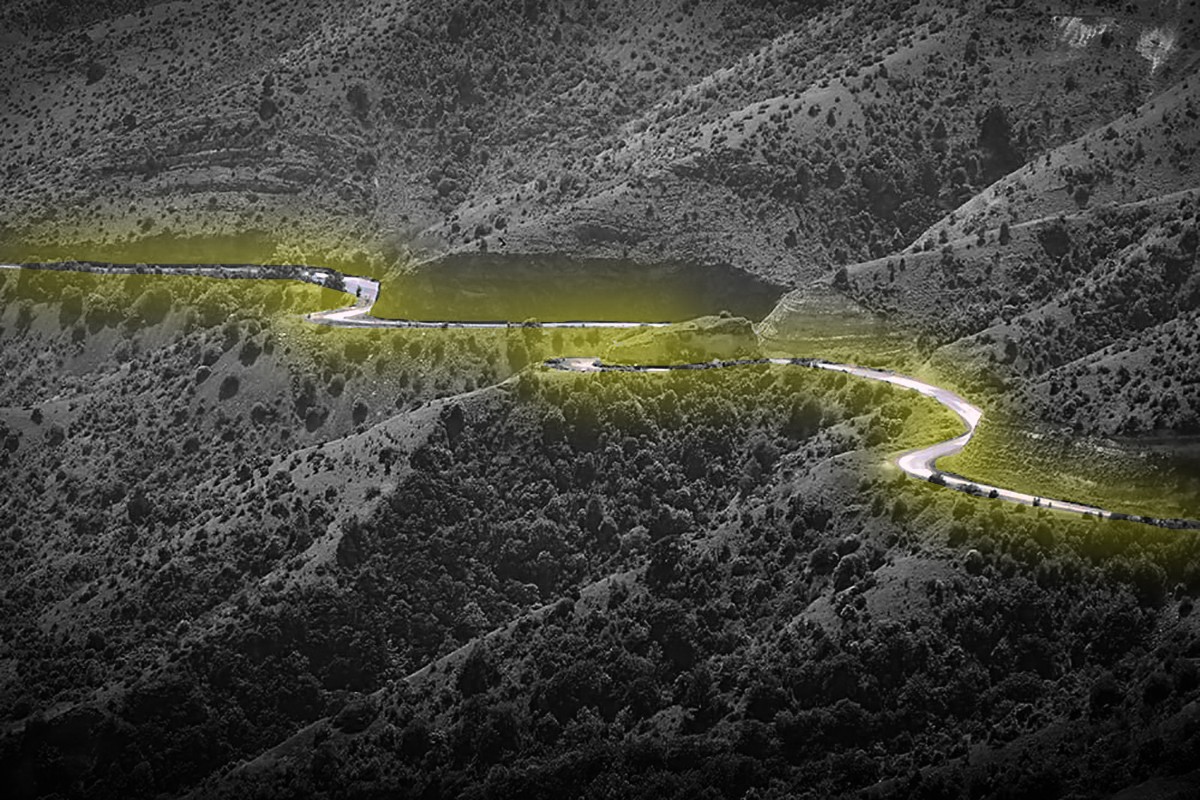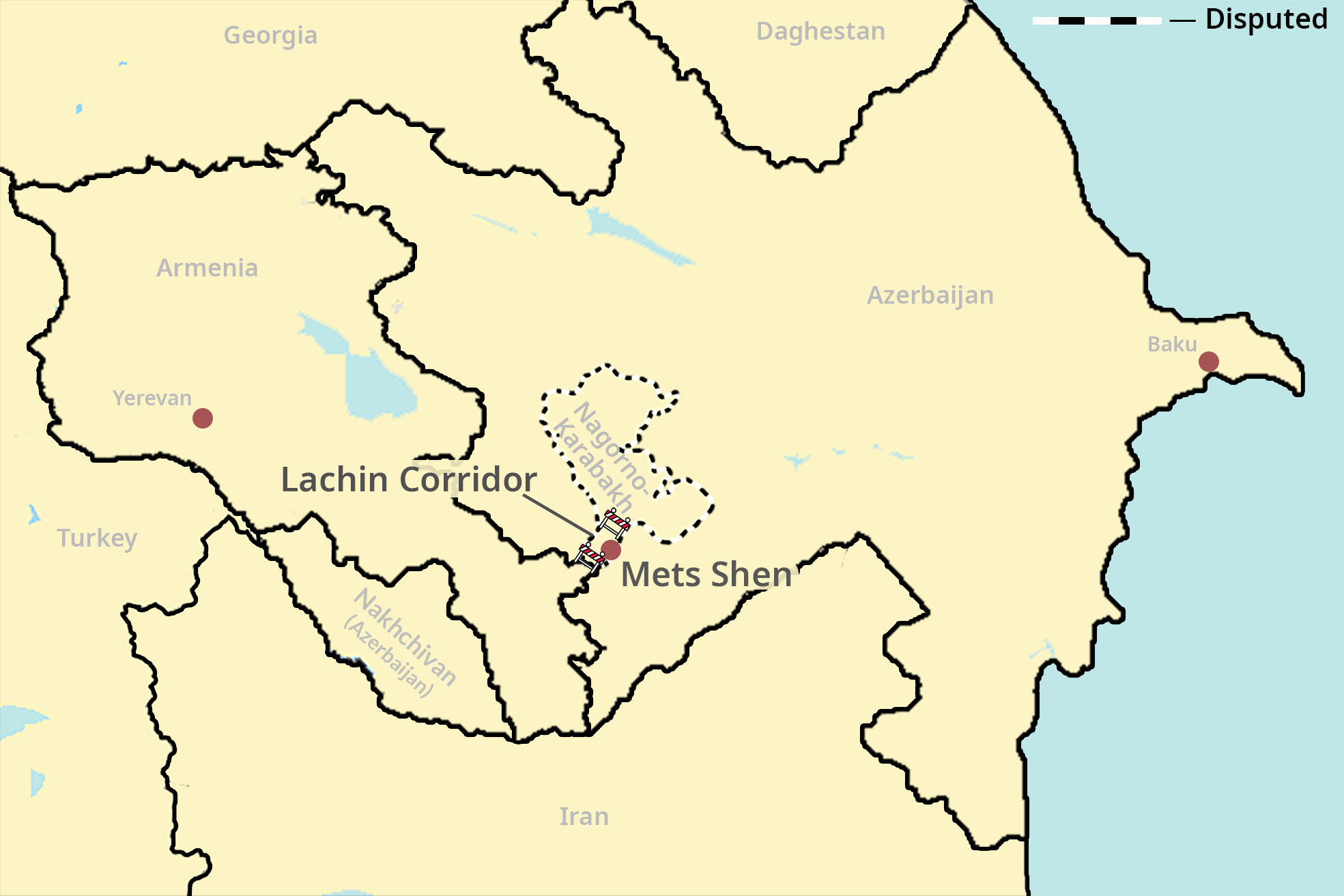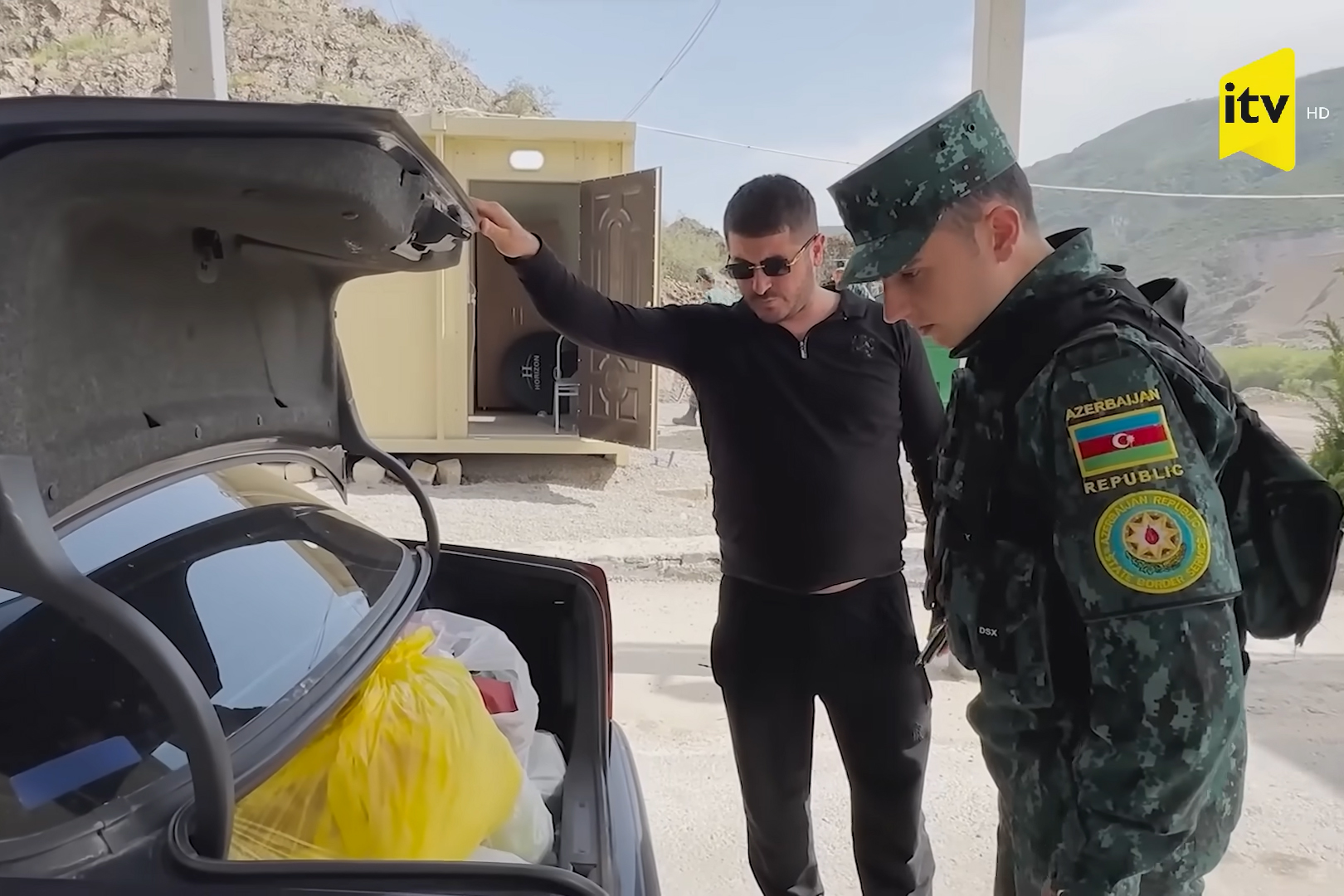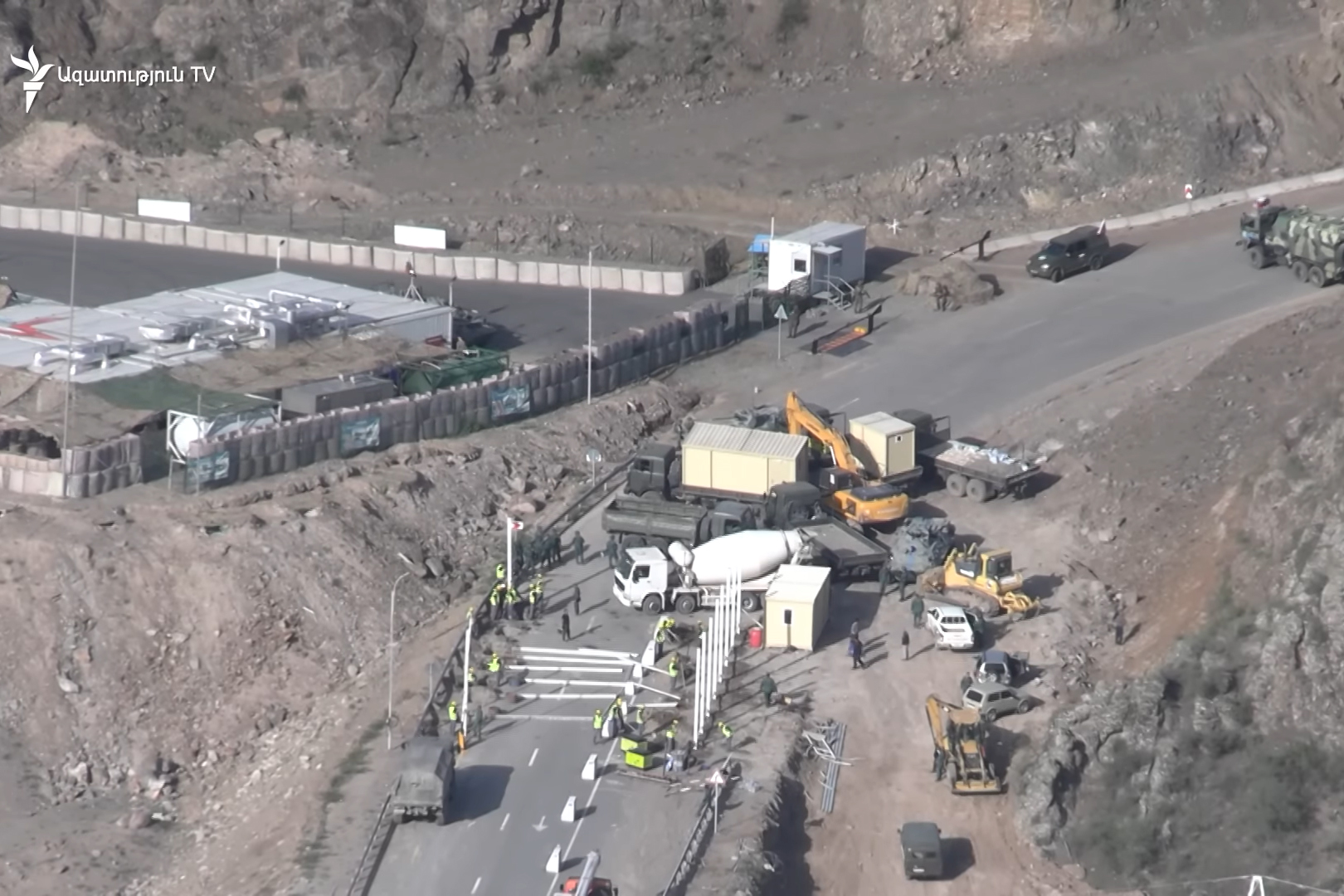
Azerbaijan is seeking to justify and normalise its checkpoint on the Lachin Corridor. If it remains in place, the Armenians of Nagorno-Karabakh can never safely travel in and out of the region, and the entire peace process could be in jeopardy.
On 28 April, Azerbaijan’s self-styled ‘environmental activists’ who were blocking the Shushi-Qarin tak intersection on the Goris-Stepanakert highway for more than three months halted their protest. These ‘eco-activists’ were substituted by Azerbaijani police officers and that part of the road continues to be blocked.
This came after an Azerbaijani checkpoint was set up in the Lachin Corridor a few days prior. Baku, which had previously denied any involvement in the blockade of Nagorno-Karabakh (or even its existence), has now officially taken responsibility for enforcing it.
After the installation of the checkpoint in the Lachin Corridor, Azerbaijani officials and pro-government experts have been trying to normalise it by peddling various propagandistic narratives. Some of them, in truly Orwellian fashion, have even characterised Baku’s escalatory steps as contributing to progress in the peace process.
In an attempt to present an image of normalcy, Azerbaijan’s border service published a video on 30 April showing several citizens of Nagorno-Karabakh passing the checkpoint in the Lachin Corridor. It later turned out that these were residents of Hin Shen, Mets Shen, Yeghtsahogh, and Lisagor, villages of the Shushi region which have been under a double blockade since the installation of the Azerbaijani checkpoint at the entrance of the Lachin Corridor.

They travelled to the town of Goris in Armenia with the help of the Russian peacekeeping contingent to get necessary supplies and were essentially forced to go through passport control on their way back home in the presence of the peacekeepers. These people were then used for propaganda purposes.
‘We are not violating the ceasefire, but if we were, it’s because we can’
The Azerbaijani government has resorted to two main narratives to justify its recent actions on the ground and the establishment of a checkpoint in the Lachin Corridor.
The first one seeks to deflect criticism by claiming that these actions do not contravene the 9 November ceasefire statement. The second one aims to downplay the significance of establishing the checkpoint in an attempt to persuade the international community that the corridor can function properly with an actual Azerbaijani presence on it.

It would be an understatement to describe these arguments as anything other than misleading and untrue.
The main claim of various Azerbaijani commentators regarding the 9 November statement is focused on the last paragraph of the document’s sixth point, where it is stipulated that Baku ‘shall guarantee safe movement of citizens, vehicles, and cargo in both directions along the Lachin Corridor’. The majority of officials and pro-government experts in Azerbaijan argue that this paragraph doesn’t exclude the possibility of establishing a checkpoint in the corridor. Moreover, they claim that the checkpoint was installed to guarantee safe movement of citizens, vehicles, and cargo.
There is no basis for this claim as it is clearly stipulated in the sixth point of the ceasefire statement that the corridor must be under the control of the Russian peacekeeping contingent: ‘The Lachin Corridor (5 km wide), which will provide a connection between Nagorno-Karabakh and Armenia while not passing through the territory of Shusha, shall remain under the control of the Russian Federation peacemaking forces’.’
It is noteworthy that the Lachin Corridor is not just a road but a stretch of territory that is 5 kilometres wide. If the ceasefire statement does not exclude the possibility of Azerbaijani presence in the corridor and it is a territory that is supposed to be under Azerbaijani control, why would it be stipulated that the corridor must be 5 kilometres wide? It is also obvious that any sort of Azerbaijani presence in the Lachin passage strips it of the ‘corridor’ status.
Perfectly understanding the illogical nature of the aforementioned argument, some Azerbaijani experts, whose job is to articulate Baku’s actions in a language that foreign audiences can comprehend, have gone one step further.
Thus, Farid Shafiyev, the head of the Center of Analysis of International Relations in Baku, a government-affiliated foreign policy think tank, argued in one of his recent tweets: ‘The trilateral statement of 10.11.2020 cannot (even if someone would interpret that it envisages no post) overwrite Azerbaijan’s Constitution and legislation’.
This represents a notable change in language that indicates the evolving situation on the ground. Essentially, through its informal channels, Baku is conveying the message: ‘We are violating the ceasefire statement because we have the capability to do so’. Given these circumstances, it is appropriate to question the prudence of signing any new documents with Azerbaijan at this time.
Unsafe passage
As indicated earlier, the second main narrative from Baku regarding the installation of the checkpoint in the Lachin Corridor attempts to present an image of normalcy. Azerbaijan seeks to demonstrate that it is feasible for Nagorno-Karabakh’s Armenians to safely use the Goris-Stepanakert highway, even with an Azerbaijani checkpoint present.
The above narrative contradicts the current reality on the ground. There are evident reasons why it is impossible to ensure safe passage along the Lachin road while an Azerbaijani checkpoint remains in place.
To begin with, the Azerbaijani border service that oversees the checkpoint has a track record of intimidating Karabakh civilians. For instance, in September 2021, Azerbaijani border guards and police stopped a minibus carrying Armenian children from Karabakh on the Goris-Kapan highway (in Armenia’s Syunik Province) and subjected them to harassment by shouting ‘Karabakh is Azerbaijan’, while scraping off a Nagorno-Karabakh flag sticker from their vehicle.
Additionally, the state border service actively participated in the Second Nagorno-Karabakh War and was involved in war crimes. This was particularly documented in a vast fact-finding report compiled by Open Society Foundations-Armenia (page 59). One such instance occurred in October 2020 in Zangilan, where Azerbaijani state border service personnel executed four Armenian prisoners of war.
Another fundamental problem that makes Azerbaijani presence in the Lachin Corridor incompatible with the free movement of Armenians through that route is the risk of arbitrary kidnappings of civilians by the Azerbaijani side. The majority of Nagorno-Karabakh’s population could be captured on trumped-up accusations.
Nearly the whole male population in Nagorno-Karabkah has served in the local army and participated in the defence of Nagorno-Karabakh during the two wars. There cannot be viable guarantees that these people will not be captured and tried in Azerbaijan as Baku considers these actions to be illegal.
The presence of the Russian peacekeeping force in the area is clearly not an obstacle for Baku, as we have already seen on a number of occasions. Given this risk, it is clear that Armenians from Nagorno-Karabakh will not use the Lachin road while the checkpoint remains in place.

Undermining the peace process
The unilateral installation of a checkpoint in the Lachin Corridor by Azerbaijan, that has been condemned by all the major actors, is a serious breach of the ceasefire statement of 2020.
Baku’s actions are intended to tighten the blockade and impose solutions that would lead to the eventual exodus of the Armenian population from Nagorno-Karabakh.
In that respect, it is crucial that the key international stakeholders involved in the region resist Azerbaijan’s attempts to normalise this new status quo on the ground.
There should also be an understanding that Baku’s recent moves pose a grave challenge to the whole security architecture in the South Caucasus.
The ceasefire statement is the basis for all the processes unfolding in the Armenian-Azerbaijani context in the last two and a half years. If a key point of the statement is openly violated by one of the sides, everything else on the agenda might also lose relevance.
The opinions expressed and place names and terminology used in this article are the words of the author alone, and may not necessarily reflect the views of OC Media’s editorial board.








